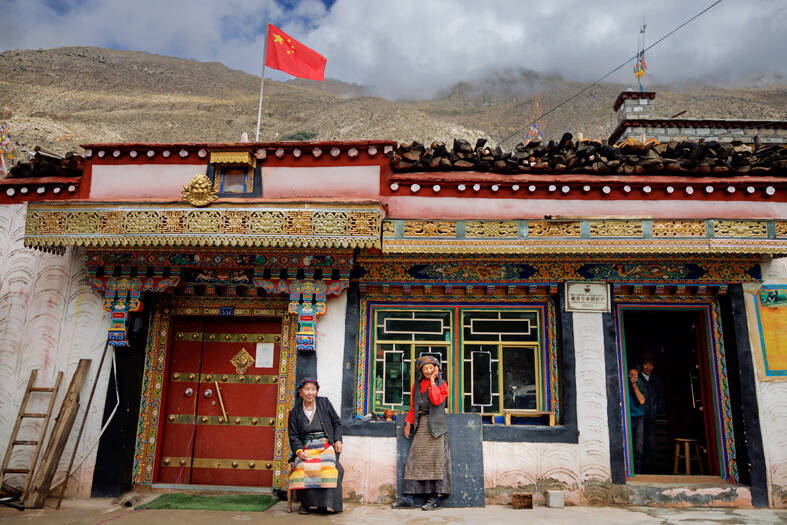China’s booming electric vehicle (EV) industry is fueling a lithium rush in the Tibetan Plateau that risks damaging the troubled region’s fragile ecology and deepening rights violations, research published yesterday said.
China is the world’s biggest EV market, but largely relies on other countries to supply the lithium used in the batteries that power low-carbon vehicles.
That is set to change as Beijing begins to exploit vast deposits on the Tibetan Plateau — about 85 percent of the country’s total lithium reserves.

Photo: EPA-EFE
This “white gold rush” has led to Chinese miners polluting the local environment with “quick, cheap and dirty” extraction and processing techniques, according to the report by Turquoise Roof, a network of Tibetan researchers.
The group used satellite data and public resources to chart the effects of lithium mining in culturally Tibetan areas and its links to automakers, including Elon Musk’s Tesla and its Chinese competitor BYD.
Those firms are “increasingly reliant on Tibet’s lithium exploitation,” it said.
“Bigger, faster electric cars require larger capacity lithium batteries — which cannot be done without a hidden footprint in Tibet,” it said.
Citing Chinese geological research, Turquoise Roof said that about 3.6 million tonnes of China’s lithium lies in hard rock deposits in Tibet and the adjacent provinces of Sichuan and Qinghai.
Miners exploiting those resources risk creating “devastating” pollution in biodiverse regions particularly vulnerable to climate change, the report says.
It pointed to a mine in Sichuan whose activities reportedly killed thousands of fish in a local river and harmed grasslands home to Tibetan herders.
“Tibetans have no voice in this latest rush to riches ... there can be no informed local consideration of whether there should be extraction,” it says.
In one example, the report cites a patch of land in a Tibetan autonomous county in Sichuan Province found to have rich lithium deposits that sparked a bidding war between firms, eventually won by Chinese battery giant Contemporary Amperex Technology Co.
However, local Tibetans “were not informed that their hill pastures were being sold, let alone consulted in any way about the land being drilled beneath their feet,” it said.
China says it has brought infrastructure and education since taking over the region in 1951, but many exiled Tibetans accused the Chinese Communist Party of repression, torture and eroding their culture, with rights groups and some Western governments backing their claims.
About 1 million Tibetan children have been separated from their families and put through “forced assimilation” at Chinese residential schools, UN experts have said.
Yesterday’s report comes as China seeks to shore up domestic supplies of critical minerals in the face of fraying ties with Western exporters.
Beijing imposed curbs on the graphite used to make EV batteries after the US restricted outflows of high-tech microchips to China.
The EU has also angered China by launching a probe into Beijing’s subsidies for its homegrown EVs.

Kehinde Sanni spends his days smoothing out dents and repainting scratched bumpers in a modest autobody shop in Lagos. He has never left Nigeria, yet he speaks glowingly of Burkina Faso military leader Ibrahim Traore. “Nigeria needs someone like Ibrahim Traore of Burkina Faso. He is doing well for his country,” Sanni said. His admiration is shaped by a steady stream of viral videos, memes and social media posts — many misleading or outright false — portraying Traore as a fearless reformer who defied Western powers and reclaimed his country’s dignity. The Burkinabe strongman swept into power following a coup in September 2022

‘FRAGMENTING’: British politics have for a long time been dominated by the Labor Party and the Tories, but polls suggest that Reform now poses a significant challenge Hard-right upstarts Reform UK snatched a parliamentary seat from British Prime Minister Keir Starmer’s Labor Party yesterday in local elections that dealt a blow to the UK’s two establishment parties. Reform, led by anti-immigrant firebrand Nigel Farage, won the by-election in Runcorn and Helsby in northwest England by just six votes, as it picked up gains in other localities, including one mayoralty. The group’s strong showing continues momentum it built up at last year’s general election and appears to confirm a trend that the UK is entering an era of multi-party politics. “For the movement, for the party it’s a very, very big

A new online voting system aimed at boosting turnout among the Philippines’ millions of overseas workers ahead of Monday’s mid-term elections has been marked by confusion and fears of disenfranchisement. Thousands of overseas Filipino workers have already cast their ballots in the race dominated by a bitter feud between President Ferdinand Marcos Jr and his impeached vice president, Sara Duterte. While official turnout figures are not yet publicly available, data from the Philippine Commission on Elections (COMELEC) showed that at least 134,000 of the 1.22 million registered overseas voters have signed up for the new online system, which opened on April 13. However,

ENTERTAINMENT: Rio officials have a history of organizing massive concerts on Copacabana Beach, with Madonna’s show drawing about 1.6 million fans last year Lady Gaga on Saturday night gave a free concert in front of 2 million fans who poured onto Copacabana Beach in Rio de Janeiro for the biggest show of her career. “Tonight, we’re making history... Thank you for making history with me,” Lady Gaga told a screaming crowd. The Mother Monster, as she is known, started the show at about 10:10pm local time with her 2011 song Bloody Mary. Cries of joy rose from the tightly packed fans who sang and danced shoulder-to-shoulder on the vast stretch of sand. Concert organizers said 2.1 million people attended the show. Lady Gaga